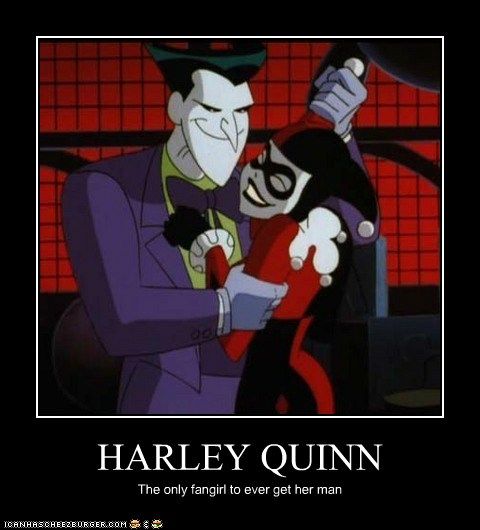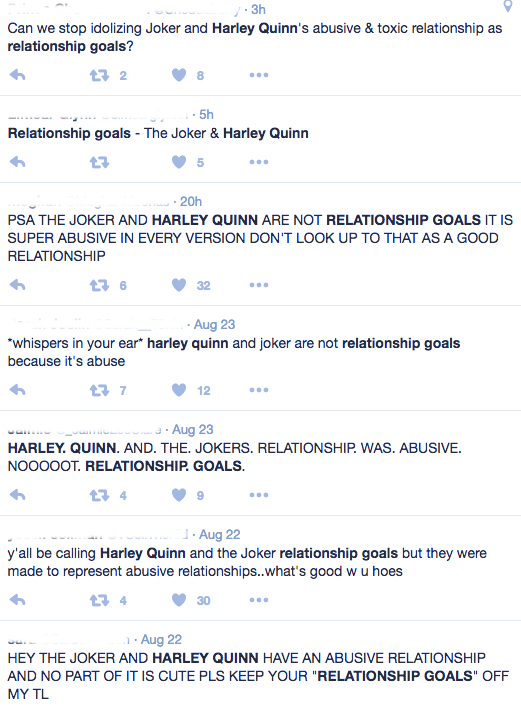The Problem With Reducing Harley Quinn to “The Only Fangirl Who Ever Got Her Man”
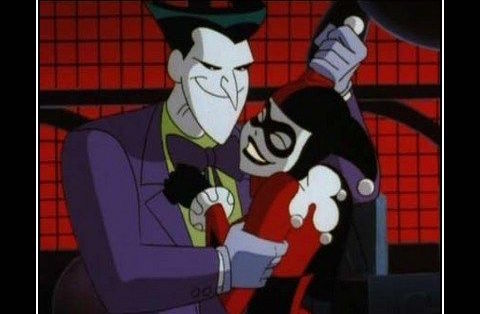
Memes that call Harley Quinn a “fangirl” for the Joker are not new. The fanbase for Harley Quinn isn’t new, either, but since Suicide Squad, and since the announcement that Margot Robbie might soon star in a Harley Quinn solo movie, questions about Harley’s value as a character have resurfaced once again.
They’re pretty typical questions, especially when it comes to a character whose inception is inextricably associated with a popular male villain. Often times, these questions come laced with a layer of judgment. Is Harley Quinn “bad” for us? Is the fanbase for Harley Quinn—particularly the young girls who like her—somehow “unhealthy”?
A simple search for “Harley Quinn relationship goals” on social media will yield you tons examples in both the “for” and “against” category. And that’s really just the tip of the iceberg when it comes to debates about whether or not it’s “okay” to like her, or whether people like her for the “right” reasons.
So it seems that there are supposedly “good” and “bad” Harley Quinn fangirls, then. The “good” ones understand she’s an abuse survivor. The “bad” fangirls like Harley for the “wrong” reasons.
For years, I’ve seen articles about how the relationship between Harley Quinn and the Joker is an abusive one and not worth idolizing. Heck, I even wrote one myself, on this very website (although hopefully I managed not to be judgmental about it—you’re not a “bad person” if you idolize that pairing, just so you know). There’s no question, at least for me, that Harley Quinn as a character represents an experience that many women find to be sadly relatable, but that doesn’t mean we should be condemning people for not recognizing that fast enough.
I don’t see the huge fandom surrounding Harley Quinn as a bad sign—even though many participants in that fandom are young girls who like Harley for the “wrong reasons” and openly idolize Harley’s relationship with the Joker. Even though Batman: The Animated Series may no longer be their reference point for Harley’s back-story, since it came out a while ago, there have been plenty of retellings of the same story since then, in the comics (both the originals and the new 52 version), the Arkham video games, and now in the new DC movie canon.
For better or for worse, the story of Harley Quinn that has been told over and over is her origin story, and that origin story revolves around her affair with the Joker and her descent into her own clown-themed super-villain lifestyle. Harley has had many other storylines since that origin; in the comics nowadays, she’s finally broken it off with Mr. J and, after a long journey of self-reclamation (not before said journey got unceremoniously interrupted and restarted by the new 52 reboot, after which point Harley had to start all over with it), she has finally begun to get arcs that don’t revolve around That One Guy She Used To Date.
In other words, she’s a character in her own right, so she deserves to have her own life outside of the Joker. Even though her entire characterization was invented to play second fiddle to him, Harley Quinn managed to break free of her creators’ intentions and of the Joker’s hold on her. Both inside the world of the comics, and beyond the fourth wall, Harley Quinn has constantly had to answer for the fact that her entire history involves the Joker—and she’s had to escape that framing. She hasn’t necessarily succeeded, though, since the depictions of her story keep placing her back at square one, re-introducing her to Mr. J once again, ad infinitum.
This is the big reason why she’s often cited as a “problematic” character, a “bad influence” on young girls, and so on. It’s easy to see why that argument still has so much traction. It doesn’t really matter that Harley Quinn has broken up with the Joker in the comics, because in popular culture, she can’t seem to be rid of him. Suicide Squad puts her back in a psychiatrist’s lab coat, sitting across a table from the Joker and trying to help him find his way towards stability. But, of course, we know how the story goes, because we’ve seen it before: Dr. Harleen Quinzel ends up falling in love, quite unprofessionally, with her dangerous client. She dons the mantle of Harley Quinn and, in Suicide Squad, dons a literal collar around her neck that reads “Puddin’,” her nickname for the Joker.
In the animated series, the Joker hated this nickname, but in Suicide Squad, he doesn’t seem to mind it … or perhaps he hates it. Maybe that scene got deleted. In fact, there are so few scenes of the Joker in Suicide Squad that it’s hard to really draw any conclusion about what Harley and Mr. J’s relationship might be like. We do know that there’s a deleted scene of him punching her, so it seems that in an earlier iteration, Suicide Squad may have intended to include some of the physical abuse that Batman: The Animated Series already had shown between the pair. However, in the gritty world of Suicide Squad, that abuse might play out very differently than it did in the slapstick environment of an animated TV show.
Also, I have my own theory that Suicide Squad was having trouble establishing Jared Leto’s Joker as likable and charming. He’s supposed to be exciting and magnetic; that’s the only reason why he’d have so many followers, let alone a “fangirl” as devoted as Harley Quinn. But because their abusive relationship is already so much a part of pop culture awareness now, Suicide Squad doesn’t even have to show us very much in order to establish that it exists. We already know this story; we can fill in the blanks. It’s hardly a surprise that these flashback scenes depicting their romance fly by at a clip, with barely any dialogue at all. It’s a morality tale between action figures at this point, a reference point that needs no further elaboration.
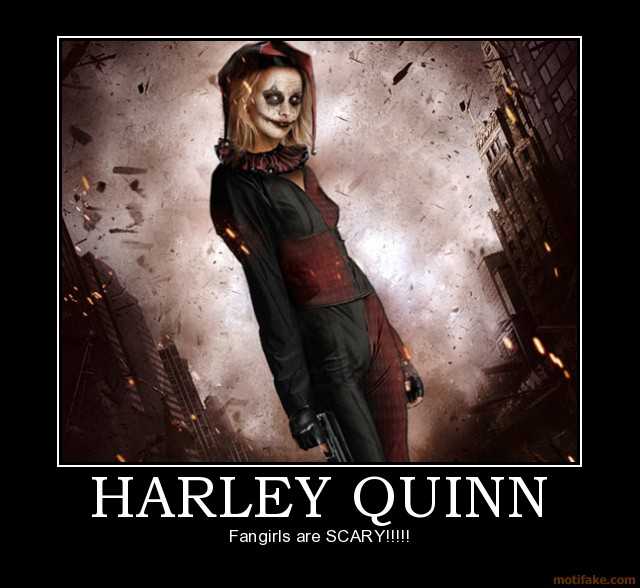 (image via Motifake)
(image via Motifake)
But let’s get back to the “fangirl” idea. Back when I first saw Harley Quinn on Batman: TAS, I didn’t know a lot about online fandoms yet; they also didn’t exist in the same form back then that they do today. These days, we have a lot of history and language to describe different patterns that we see in the fandom, such as the practice of “woobifying” villainous characters—often white male characters. I explained how this process works when I wrote this article about the fandom surrounding Kilgrave, the villain of Jessica Jones.
The word “woobie” is a term that refers to a comfort blanket—pretty much the polar opposite of the Joker, or a character like Kilgrave or Kylo Ren, but in the world of fan-fiction, these villainous characters can be re-imagined as romantic leads who are willing to put aside their issues for One Special Girl. Or, perhaps, they don’t put aside their issues at all and continue to behave as abusively in fan-works as they did in their original iterations—but within the world of that fan-fiction, they can be contained and controlled, in a way, by the writer.
Harley Quinn was invented long before I even knew fan-fiction and “woobification” existed, and yet, she seems like an unintentionally perfect answer to this practice. Codifying her relationship with the Joker as her simply being a “fangirl” does seem a bit reductive to me, but as a person who spends a lot of time looking at fan-created works online, I can’t help but say I can understand why “fangirls” would relate so much to Harley Quinn … as well as why “fangirls” might also feel so incredibly angry about the idea of Harley Quinn. Perhaps they might even feel both at once—the relatability and also the anger.
That’s a big reason why I can relate to her, even though I haven’t personally gone off the deep end into a fascination with a villainous character myself. I still understand the thought pattern. I’ve certainly dated people who were clearly wrong for me, but I believed I could change them. (Spoiler alert: Mr. J never changes.)
Fandom provides a lens through which we all can navigate those problems and consider them without literally looking at our own lives and admitting them fully. By looking at the choices made by a very extreme character like Harley Quinn, it’s possible to look inward also and think, “Why can I relate to this? What about this character’s choices remind me of myself so much?”
I don’t think that’s why everyone likes Harley Quinn. With a character this popular, the answer would never be just one thing. When I think about why people like her, I assume it’s for the same reasons that I like her, but from what I’ve read, there are a whole lot of other reasons that people like her that I can’t relate to whatsoever.
For example, I’ve seen writers speculate that the reason why people like Harley is because she’s physically attractive; this IGN editorial explains, “there’s a sexual element to Harley that can’t be ignored. Like most of Batman’s female villains, she qualifies as a femme fatale. She’s lithe, deadly, and fond of wearing skintight bodysuits.” That’s after the writer spent a couple of paragraphs reminding us all how frequently people (mostly women) cosplay as Harley Quinn. In this lengthy Reddit thread from fans discussing why they like Harley Quinn so much, one user explained that it’s because she’s “the perfect girlfriend.”
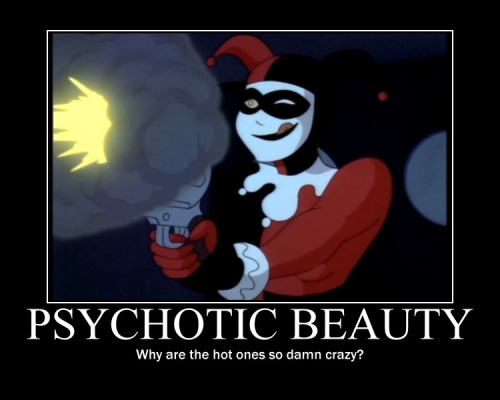 (image via Pinterest)
(image via Pinterest)
I think it’s funny that the discussion of Harley Quinn as a supposed “problematic” character seems to focus so much on fangirls, rather than fanboys. Yes, Harley Quinn has become a character who many fangirls have embraced; at first we might idolize her (and her toxic relationship), but as we all grow older, we realize Harley Quinn deserves better (and so do we all). To look at that story and instead extrapolate that the reason why Harley Quinn resonates with people is because she’s sexy and also a devoted girlfriend … well, that is a pretty “problematic” takeaway, in my view.
I think most adults will agree that Harley Quinn’s relationship with the Joker isn’t a positive one, but I also think that, unfortunately, many people also think that Harley Quinn’s “devotion” is a positive quality, and one that’s reasonable to expect of their partner.
There’s nothing wrong with being a “fangirl,” and there’s also nothing wrong with realizing that you’re in a relationship with someone who would rather have you be their “fangirl” than an equal partner. That’s what the story of Harley Quinn taught me, anyway. I don’t feel judgmental towards the fans who are still figuring that part of the story out. The only Harley Quinn fans that make me feel judgmental at this point are the ones who believe that her brand of “loyalty” and “devotion” are reasonable qualities to expect from a partner. They’re not.
Harley Quinn’s origin story is the only one that most people know about her. I actually don’t think that’s a bad thing, or that such a popular character is somehow “defined by her abuser,” or that we have to keep seeing, over and over, the story of Harley Quinn meeting the Joker and getting caught in his orbit. I think that story has ended up influencing fandom in ways that might seem hard to see right now, but which I’ve identified in myself, at least. I think it’s worth considering her as an analogy to the idea of fandom as escapism, and how that isn’t necessarily a bad thing, so long as you eventually find your way out of it and into a new and better life.
I also think it’s worth rethinking the framing of Harley Quinn as “hot and crazy,” as well as the framing of “fangirls” as being “crazy” (but also “hot”) and reducing Harley to try to make her fit into that classification. The memes fall short of acknowledging why her story matters to fangirls, and why it’s probably not a coincidence that Harley Quinn remains such an incredibly popular character to cosplay. It’s not because she’s “hot and crazy.” Maybe it’s because she’s a “fangirl” … but in addition to being “The Only Fangirl Who Ever Got Her Man,” she’s also a “fangirl” who far exceeded “her man” in terms of popularity, success, and eventual happiness. That’s the ultimate triumph.
(Featured image via Pinterest)
Want more stories like this? Become a subscriber and support the site!
—The Mary Sue has a strict comment policy that forbids, but is not limited to, personal insults toward anyone, hate speech, and trolling.—
Follow The Mary Sue on Twitter, Facebook, Tumblr, Pinterest, & Google+.
Have a tip we should know? [email protected]
